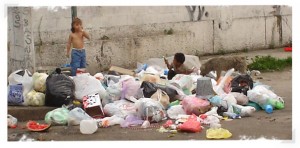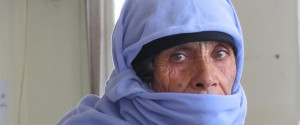 Some years ago I worked on a mission to street children, in Guadalajara, Mexico. We used to take out food and drink and sit with them and talk about Jesus. We would go out at night, a group of four or five of us, when the streets were quieter. We’d stand in places where they were used to us coming, perhaps on a street corner, and they would come out of the rickety shelters or empty houses or wherever it was they were surviving. I learnt not to lean on all walls to avoid the cockroaches. One day I saw something I hoped I’d never see again in my entire life. A young street girl, perhaps 15 or 16, walked along holding the hand of a little boy, who can’t have been more than three years old. I thought he was her son, though he could have been a younger sibling. They were both skinny and she was poorly dressed, but the only clothing on the boy’s body was a black plastic rubbish bag. It had been torn to fit. For me, it epitomised the utter lack of value society put on this tiny human life – discarded and only fit for the rubbish dump.
Some years ago I worked on a mission to street children, in Guadalajara, Mexico. We used to take out food and drink and sit with them and talk about Jesus. We would go out at night, a group of four or five of us, when the streets were quieter. We’d stand in places where they were used to us coming, perhaps on a street corner, and they would come out of the rickety shelters or empty houses or wherever it was they were surviving. I learnt not to lean on all walls to avoid the cockroaches. One day I saw something I hoped I’d never see again in my entire life. A young street girl, perhaps 15 or 16, walked along holding the hand of a little boy, who can’t have been more than three years old. I thought he was her son, though he could have been a younger sibling. They were both skinny and she was poorly dressed, but the only clothing on the boy’s body was a black plastic rubbish bag. It had been torn to fit. For me, it epitomised the utter lack of value society put on this tiny human life – discarded and only fit for the rubbish dump.
I’ve seen it again lately in the recent news reels of Syrian refugees pushing through the border of Macedonia on their way northwards, further into Europe. A young man and a fifteen year old boy told the camera-man that their only hope was to go on and find a country to take them, because their own was finished. Exhausted by the dangerous journey, the fifteen year old asked in broken English why they were being treated so badly in Greece. ‘We have nothing,’ he said. The camera stayed on them as they turned and continued their walk into Macedonia: two desperate refugees from an apocalyptic war zone. They were both wearing black plastic rubbish bags over their T shirts. Not because it was raining, but perhaps as another thin layer to help keep them warm as they walked into the night. I thought again how symbolic it seemed – two human beings who nobody wanted; seemingly as worthless as trash.
Thank God, there are small chinks of hope. Poland has offered to take Christians from Syria, and the Barnabas Fund is helping to get them there. Barnabas Fund says, ‘The Polish government and churches in Poland have made a wonderful offer; they will give refuge to Syrian Christian families, if they can get there.’ It’s not an easy road: read the following article in the Telegraph: http://www.telegraph.co.uk/news/worldnews/islamic-state/11748943/UK-is-denying-refuge-to-Christians-fleeing-Isil-say-church-leaders.html If you’d like to support Barnabas go to the website: www.barnabasfund.org.
But what about the older people in these war zones?

Research funded by Age International shows that older, disabled and injured Syrian refugees are the hidden victims of the three-year long conflict. Agencies are not only failing to take into account their specific needs, but also failing to identify them. How can an older, frail person make the trek to freedom? Even when they have been helped, many frail elderly refugees admitted feeling like a burden on their families. They expressed guilt that they were unable to help with household chores or provide financially for their family. Many admitted to going without food in order to ‘provide better meals to younger members of the family’. Age International has a project to help older people in Syria. You can read about it, and perhaps donate, here: https://www.ageinternational.org.uk/what-we-do/Syria-conflict/Where-did-your-money-go/














